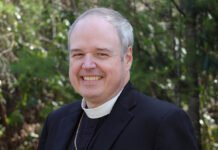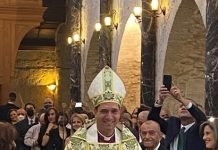Lent begins today, and as the effects of this pandemic continue to shutter and mask so much of life, I search about for a fruitful Lenten discipline to embrace. I found mine from last Sunday’s gospel reading. The Transfiguration narrative (Mark 9:2-9) has left me like the disciples longing to see Jesus alone and upon hearing the voice from heaven—“This is my beloved Son”—to listen to him. To see Jesus, to really see him is to follow him. To listen to him is to obey him. That surely gets us to the heart of Lent, to taking up one’s cross, and following Jesus to his.
The liturgy of the church teaches us that a holy Lent is observed “…by self-examination and repentance, by prayer, fasting, and alms-giving; and by reading and meditating on God’s holy Word.” (BCP 2019 p. 544) All of which can be done even during a pandemic. One practice particularly helpful for seeing and listening to Jesus in a shuttered and masked season of life is the last mentioned in the invitation from the Prayer book—reading and meditating on God’s holy Word.
In the middle years of the 1550s, Princess Elizabeth was held under guard on Queen Mary’s orders. She had been moved from her confinement in the Tower in London to Woodstock, a dilapidated hunting lodge of her late illustrious father, Henry VIII. It was a cold and wet estate even in the summer, and as the season gave way to autumn, grew unbearable even for those servants the suspicious Queen had charged to watch her half-sister. Elizabeth, who seemed to have much time on her hands for rumination, removed as she was from the intellectual, cultural, and social pursuits she found so alluring, did have at least one book to console her. Carolly Erickson, in The First Elizabeth, tells us “an English translation of St. Paul’s Epistles that belonged [at the lodge] has been preserved.” In it, on a blank space she wrote a passage that gives us a glimpse of her meditative life.
“I walk many times into the pleasant field of the Holy Scriptures, where I pluck up the goodly some herbs of sentences by pruning, eat them by reading, chew them by musing, and lay them up at length in the high seat of memory by gathering them together; that so having tasted the sweetness I may the less perceive the bitterness of this miserable life.”
On the silken corners of the book were various mottos that she embroidered with her own hands: “Heaven my Fatherland”, “Christ the goal of life” and “Blessed is he who reading the riches of scripture turns those words into deeds.” There was also a star of gold with the inscription in Latin, “Tenacious virtue overcomes all, Elizabeth the Captive.” With her life in constant threat by the Queen’s disfavor and jealous fear, removed from the various things of the court she found so stimulating, she may well have given way to despair. Instead, she gained strength from God’s grace as she read, meditated upon, and memorized, through rumination, the sacred scriptures. In silence and isolation, her capacity for tenacity and inner counsel deepened.
As events proved, it was to be one of the last times in her long and eventful life she would be left so alone with her own counsel and meditation. Not that she became saintly, but she did become a woman of shrewd and expansive intelligence, whose competence to listen to counsel, while keeping her own, is justly renowned.
Too often, we chafe at our life circumstances, not knowing the end of life from the beginning, reckoning neither the time nor the season. Wisdom and prudence, however, is harvesting from each season the fruit or grain that is there. The future Queen Elizabeth seemed intuitively to know what time it was even as a young women in her early twenties, reading, chewing, and memorizing the scriptures making sweet a bitter and disappointing season of her life. May a similar grace pervade this season of ours as we take up the scriptures—perhaps for a Lenten walk in “the pleasant field” of the Gospel of Mark (the gospel assigned for this lectionary year) with the goal of seeing Jesus alone that we might follow him; and listening to him, that we might obey him.
This meditation is from The Rt. Rev. Mark J. Lawrence, Bishop of The Anglican Diocese of South Carolina, February 17, 2021



